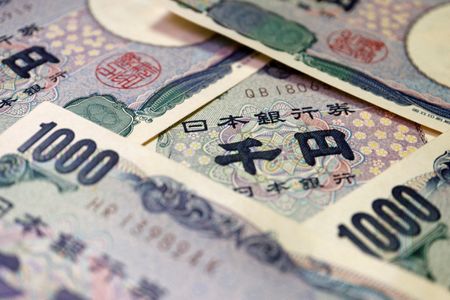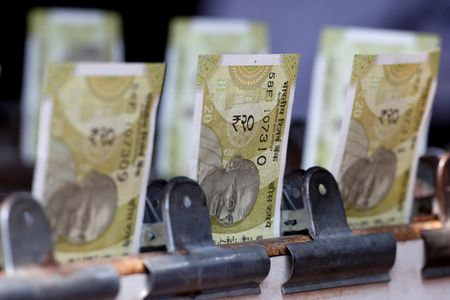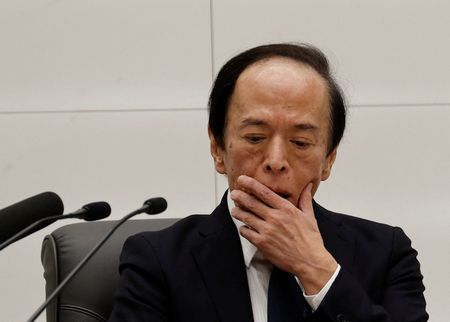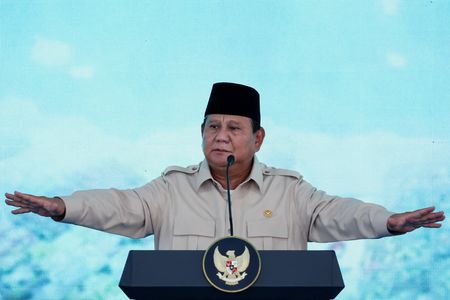By Leika Kihara and Makiko Yamazaki
TOKYO (Reuters) -Japan on Friday escalated its warning of currency intervention and the central bank governor signalled the chance of a near-term interest rate hike, as authorities sought to combat unwelcome yen falls blamed for pushing up the cost of living.
The yen is down around 6% since Prime Minister Sanae Takaichi was elected leader of her party on market concern her administration could issue more debt to fund a big spending package, casting doubt on Japan’s grip on finances.
The currency’s fall has also been driven by market bets that Takaichi, known as an advocate of expansionary fiscal and monetary policy, could push back against a near-term rate hike.
Finance Minister Satsuki Katayama said Japan sees intervention in the foreign exchange market as a possibility in dealing with excessively volatile and speculative moves in the yen, issuing the strongest warning to date against recent falls in the currency.
Bank of Japan Governor Kazuo Ueda also said the central bank will debate the “feasibility and timing” of a rate hike in upcoming meetings, signalling the prospect of increasing still-low borrowing costs as soon as next month.
The remarks highlight growing concern among policymakers about a persistently weak yen, which gives exports a boost but hurts households’ cost of living through higher import prices.
“We are alarmed by recent one-sided, sharp moves in the currency market,” Katayama told a news conference on Friday, when asked about recent declines in the yen.
“It is important for currency rates to move stably, reflecting fundamentals. We will take appropriate action as needed against excess volatility and disorderly market moves, including those in the long term,” based on the U.S.-Japan agreement signed in September, he said.
In that agreement, Japan’s finance ministry and the U.S. Treasury Department reaffirmed their commitment to “market-determined” exchange rates, while agreeing that interventions should be reserved for combating excess volatility.
When asked whether Japan’s response could include currency intervention, Katayama said: “Yes, that’s written in the September statement, so it’s obviously so.”
The dollar fell 0.14% to 157.26 yen after Katayama’s remarks, before bouncing back to around 157.50 yen in Asia on Friday.
The remarks are an escalation from policymakers, who had been saying up until Thursday they were alarmed by one-sided, rapid moves in the yen and watching market developments with “a high sense of urgency”.
FOCUS ON BOJ DECEMBER MEETING
Japan last intervened in the currency market in July 2024, when the yen fell to a 38-year low of around 161.96 to the dollar. Then, before directly stepping into the market, authorities warned of taking “decisive action”.
“Today’s comments suggest there is still some distance before direct intervention,” said Akira Moroga, chief market strategist at Aozora Bank.
“Having said that, authorities are probably preparing to act any time. There could be intervention once the dollar rises near 160 yen,” he said.
Hirofumi Suzuki, chief currency strategist at SMBC, also saw 160 yen per dollar as the line-in-the-sand for intervention.
“I think Japan’s monetary authorities would not hesitate too much when it comes to intervening in the foreign exchange market to curb excessive volatility,” Suzuki said.
The weak yen was also a key trigger for BOJ action last year, when the central bank raised interest rates to 0.25% in July in tandem with the government’s yen-buying intervention.
While initially voicing displeasure over a near-term rate hike, Takaichi and her finance minister have recently nodded to the BOJ’s gradual rate-hike plan as the yen ground down.
Speaking in parliament on Friday, Ueda said the weak yen’s boost to inflation has become bigger than in the past as firms are more actively hiking prices and wages.
“We must be mindful that price rises, through such channels, could affect inflation expectations and underlying inflation,” he said, suggesting the weak yen could feature prominently in the BOJ’s next two-day policy meeting ending on December 19.
While the BOJ has kept rates steady since hiking them to 0.5% in January, Ueda has dropped strong hints of action in December or January next year.
(Reporting by Leika Kihara and Makiko Yamazaki; additional reporting by Rocky Swift and Noriyuki Hirata; Editing by Jamie Freed and Tom Hogue)










